Related Research Articles

The North Atlantic Treaty Organization, also called the North Atlantic Alliance, is an intergovernmental military alliance between 31 member states – 29 European and two North American. Established in the aftermath of World War II, the organization implemented the North Atlantic Treaty, signed in Washington, D.C., on 4 April 1949. NATO is a collective security system: its independent member states agree to defend each other against attacks by third parties. During the Cold War, NATO operated as a check on the threat posed by the Soviet Union. The alliance remained in place after the dissolution of the Soviet Union and the Warsaw Pact, and has been involved in military operations in the Balkans, the Middle East, South Asia, and Africa. The organization's motto is animus in consulendo liber.

Physical security describes security measures that are designed to deny unauthorized access to facilities, equipment, and resources and to protect personnel and property from damage or harm. Physical security involves the use of multiple layers of interdependent systems that can include CCTV surveillance, security guards, protective barriers, locks, access control, perimeter intrusion detection, deterrent systems, fire protection, and other systems designed to protect persons and property.

The International Security Assistance Force (ISAF) was a multinational military mission in Afghanistan from 2001 to 2014. It was established by United Nations Security Council Resolution 1386 pursuant to the Bonn Agreement, which outlined the establishment of a permanent Afghan government following the U.S. invasion in October 2001. ISAF's primary goal was to train the Afghan National Security Forces (ANSF) and assist Afghanistan in rebuilding key government institutions; it gradually took part in the broader war in Afghanistan against the Taliban insurgency.

Newport is a city and county borough in Wales, situated on the River Usk close to its confluence with the Severn Estuary, 12 mi (19 km) northeast of Cardiff. With a population of 145,700 at the 2011 census, Newport is the third-largest authority with city status in Wales, and seventh most populous overall. Newport became a unitary authority in 1996 and forms part of the Cardiff-Newport metropolitan area. Newport was the site of the last large-scale armed insurrection in Great Britain, the Newport Rising of 1839. The population grew considerably during the 2021 census, rising to 159,587, the largest growth of a unitary authority in Wales.
Sir Terence Hedley Matthews is a Welsh-Canadian business magnate, serial high-tech entrepreneur, and Wales' first billionaire. He was the richest man in Wales until 2012, when he was surpassed by Sir Michael Moritz.
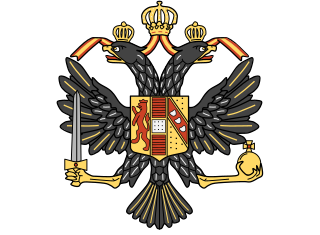
1st The Queen's Dragoon Guards (QDG) is a regiment in the Royal Armoured Corps of the British Army. Nicknamed The Welsh Cavalry, the regiment recruits from Wales and the bordering English counties of Cheshire, Herefordshire, and Shropshire, and is the senior cavalry regiment, and therefore senior regiment of the line of the British Army.
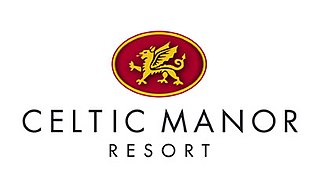
Celtic Manor Resort is a golf, spa and leisure hotel and resort in the city of Newport, South East Wales. Owned by Sir Terry Matthews, the resort is located on the south-facing side of Christchurch Hill in eastern Newport, near Junction 24 of the M4 motorway. The golf courses run over the north-facing side of Christchurch Hill down into the Vale of Usk, overlooking the Wentwood escarpment. The resort's area is circa 2,000 acres (810 ha).
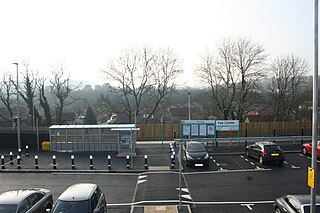
Pye Corner railway station is a station serving a residential area in the west of Newport, Wales, between the suburbs of Bassaleg and High Cross. It opened on 14 December 2014.

The Secure Fence Act of 2006, also labelled H.R. 6061, is an act of the United States Congress which authorized and partially funded the construction of 700 miles (1,125 km) of fencing along the Mexican border. The Act was signed into law on October 26, 2006, by U.S. President George W. Bush, who stated at the time that the Act would "help protect the American people", would "make our borders more secure", and was "an important step toward immigration reform".

The 2004 Istanbul summit was held in Istanbul, Turkey from 28 to 29 June 2004. It was the 17th NATO summit in which NATO's Heads of State and Governments met to make formal decisions about security topics. In general, the summit is seen as a continuation of the transformation process that began in the 2002 Prague summit, which hoped to create a shift from a Cold War alliance against Soviet aggression to a 21st-century coalition against new and out-of-area security threats. The summit consisted of four meetings.

Target hardening, also referred to simply as hardening when made clear by the context, is a term used by police officers, those working in security, and the military referring to the strengthening of the security of a building or installation in order to protect it in the event of attack or reduce the risk of theft. It is believed that a "strong, visible defense will deter or delay an attack".
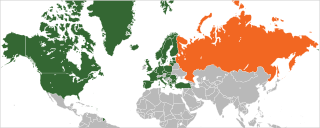
Relations between the NATO military alliance and the Russian Federation were established in 1991 within the framework of the North Atlantic Cooperation Council. In 1994, Russia joined the Partnership for Peace program, and on 27 May 1997, the NATO–Russia Founding Act (NRFA) was signed at a NATO Summit in Paris, France, enabling the creation of the NATO–Russia Permanent Joint Council (NRPJC). Through the early part of 2010s NATO and Russia signed several additional agreements on cooperation. The NRPJC was replaced in 2002 by the NATO–Russia Council (NRC) established for handling security issues and joint projects.
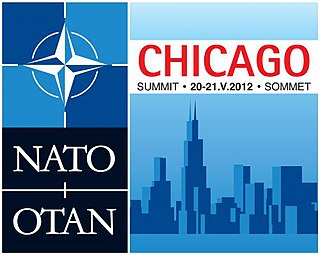
The 2012 Chicago summit was a meeting of the heads of state and heads of government of the North Atlantic Treaty Organization (NATO), held in Chicago, Illinois, on 20 and 21 May 2012. This was the first time ever that a NATO summit was held in the United States outside of the nation's capital, Washington, D.C. The event was originally scheduled to coincide and be held after the 2012 G8 summit in Chicago as well, but the G8 summit was later rescheduled to be held at Camp David.

The 2014 Wales Summit of the North Atlantic Treaty Organization (NATO) was a meeting of the heads of state and heads of government of the NATO countries, held in Newport, Wales on 4 and 5 September 2014. Such summits are sporadically held and allow leaders and officials from NATO Allies to discuss current issues of mutual concern and to plan strategic activities. The 2014 summit has been described by US Navy Admiral James G. Stavridis as the most important since the fall of the Berlin Wall.

Migrants have gathered in and around Calais, on the northern French coast, since at least the late 1990s seeking to enter the United Kingdom from the French port by crossing the Channel Tunnel or stowing away in the cargo area of lorries heading for ferries that cross the English Channel. During this time, informal camps of migrants have formed, the most notorious commonly referred to as the Calais Jungle. Other migrants come to the area because they are homeless while seeking asylum in France. The presence of migrants in and around Calais has affected the British and French governments, the Eurotunnel and P&O Ferries companies, and lorry drivers heading for the UK and their companies. EuroTunnel, the company that operates the Channel Tunnel, said that it intercepted more than 37,000 migrants between January and July 2015.

In 2015, Hungary built a border barrier on its border with Serbia and Croatia. The fence was constructed during the European migrant crisis, with the aim to ensure border security by preventing illegal immigrants from entering, and enabling the option to enter through official checkpoints and claim asylum in Hungary in accordance with international and European law. The number of illegal entries to Hungary declined greatly after the barrier was finished as it effectively abolished the entry to Hungary.

The North Macedonia border barrier is a border barrier built by North Macedonia on its border with Greece. It was constructed as a response to the European migrant crisis. The construction of the barrier began in November 2015, modeled similarly to the Hungarian border barrier.

The Bulgaria–Turkey border is a 513 km (319 mi) long international border between the Republic of Bulgaria and the Republic of Turkey. It was established by the Treaty of San Stefano in 1878 as an inner border within the Ottoman Empire between Adrianople Vilayet and the autonomous province of Eastern Rumelia. The current borders are defined by the Treaty of Constantinople (1913) and the Bulgarian–Ottoman convention (1915). The border was reaffirmed by the Treaty of Lausanne ten years later, though Bulgaria was not a party to the latter treaty as it had earlier ceded to Greece that part of its border with Turkey which was modified by the Bulgarian-Ottoman convention.

This is a timeline of the European migrant crisis of 2015 and 2016.

The International Convention Centre Wales is a 5,000-capacity venue in the city of Newport, Wales. The venue has a main auditorium with fixed seating for 1,500 delegates, six rooms of exhibition space, and 43,000 sq ft (4,000 m2) of pillar-free space. ICC Wales is located on the Celtic Manor Resort site which hosted the 2010 Ryder Cup and 2014 NATO summit.
References
- 1 2 3 "Who, What, Why: What exactly is the UK's National Barrier Asset?". BBC News. 30 June 2015. Retrieved 30 June 2015.
- ↑ Home Office (March 2009). The United Kingdom's Strategy for Countering International Terrorism (PDF). London: The Stationery Office. p. 107. ISBN 9780101754729 . Retrieved 30 June 2015.
- ↑ "Nato Summit 2014: Hundreds of protesters reach steel barriers protecting world leaders at Celtic Manor". Wales Online. 4 September 2014.
- ↑ "Nato summit: Road closures details in Newport and Cardiff". BBC News Online . 7 August 2014.
- ↑ "Nato summit security barriers being cleared in Cardiff". BBC News Online . 6 September 2014.
- ↑ Rigby, Elizabeth (28 June 2015). "Britain to erect high-security fence at Calais lorry terminal" . Financial Times . Retrieved 30 June 2015.
- ↑ "Anti-terror barriers installed ahead of Edinburgh Festival" . Retrieved 2018-04-25.
- ↑ "National Vehicle Threat Mitigation Unit - Eurovision song contest" . Retrieved 10 May 2023.